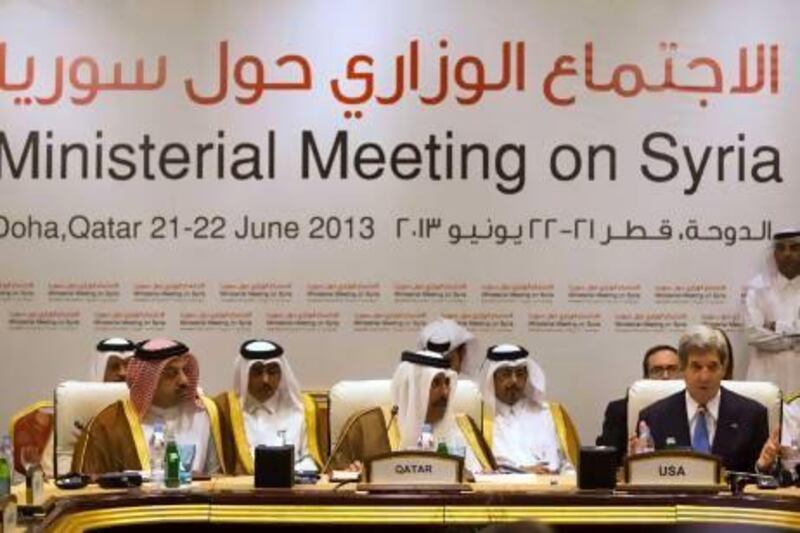DOHA // Countries supporting the Syrian opposition promised to step up political and military aid as a means to balance the conflict against Bashar Al Assad's regime and rescue hopes for a political solution.
Meeting in Qatar, the Friends of Syria argued that the influx of fighters from Iran-backed Lebanese Hizbollah group had tipped the fighting in Mr Al Assad's favour and was jeopardising plans for a Geneva peace conference, now twice delayed from taking place in May and June.
The 11 members - including the UAE, Qatar, US, France and Britain - agreed "to provide urgently all necessary material and equipment to the opposition on the ground", the group said after the meeting.
Peace "cannot be achieved without a balance of force on the ground", Sheikh Hamad bin Jassim Al Thani, Qatar's foreign minister and prime minister, told the gathering. "Arms may be the only way to achieve peace."
Yesterday's meeting followed weeks of rebel losses in Syria after Hizbollah fighters joined the battle on behalf of the regime in May. After retaking the strategic city of Qusayr near the border with Lebanon, the regime started building its forces around the country's second city, Aleppo, the mainly Sunni rebel commanders have warned.
Delegates said their meeting was intended to nail down specifics about increasing aid to the rebels, including what assistance could be provided by member countries.
This was the first meeting of the Friends of Syria since Washington announced on June 13 that it would begin offering lethal assistance to the opposition. Speaking after the meeting, John Kerry, the US secretary of state, declined to specify the types of military assistance that could be provided.
Other western countries, including Britain and France, said they were still debating whether to provide military aid. The UK foreign secretary William Hague said his government had "taken no decision" on the matter.
But yesterday's meeting offered an indication that the United States and other western powers have largely given a nod of approval to recent arms shipments - reportedly from Gulf states - to the rebels, including those providing heavy weaponry.
Over the weekend, the Free Syria Army spokesman Louay Maqdad said that his forces had obtained heavy weapons such as anti-aircraft and anti-tank weaponry that he said could "change the course of the battle".
"We have decided that we have no choice to try to get to this negotiation, but to provide greater assistance of one kind or another, each nation making its own decision as to what it is comfortable doing," said Mr Kerry.
Despite new promises of lethal aid, the US and other western powers have been concerned about the possibility that weapons - particularly anti-aircraft systems - could fall into the hands of extremist groups, including the Al Nusra Front, which Washington labels as a terrorist organisation.
Part of the discussions yesterday focused on allaying those fears: the Friends of Syria group has worked to create a unified pipeline for the arms, channelled explicitly through the Supreme Military Council of the Free Syrian Army, under the command of Salim Idriss.
"There has been an improvement in coordinating" through the council, a European diplomat said, though he declined to say whether the recent heavy arms shipments had gone through Mr Idriss.
Mr Al Thani told reporters that all but two countries attending "agreed as to how to provide practical support through the military council".
It was not immediately clear which two members of the group objected to the mechanism.
In addition to military assistance, the 11 countries also pledged to increase humanitarian support for a conflict that the United Nations estimates has claimed more than 93,000 lives and displaced several million Syrians from their homes.
This month, the UN announced its largest ever appeal for humanitarian aid, requesting US$5 billion to deal with spiralling crisis both within Syria and in neighbouring countries, were more than 1.6 million Syrians now reside.
The US will provide an additional $300 million in humanitarian assistance, Mr Kerry said yesterday.
Meanwhile, the US secretary of state indicated that he and other members would continue to push for the Geneva II conference, meant to bring together parties of the conflict to seek a political solution.
That conference had initially been scheduled for May, but a firm date has never been set and differences in opinion between the US and Russia in particular have stymied efforts to hold the talks.
Mr Kerry said senior American and Russian diplomats would meet in Geneva in hopes of determining a date for the talks. The US ambassador to Syria Robert Ford and the under secretary for political affairs Wendy Sherman will travel to Switzerland to meet their Russian counterparts as well as the UN special envoy Lakhdar Brahimi next week.
Speaking at the opening of the conference, the UK foreign secretary said there was still no clear timeline for the Geneva conference.
"I don't think there's any expectation that this will fall together in the next few weeks," Mr Hague said.
The Friends of Syria group comprises Britain, Egypt, France, Germany, Italy, Jordan, Qatar, Saudi Arabia, Turkey, the UAE and the US.
edickinson@the national.ae





